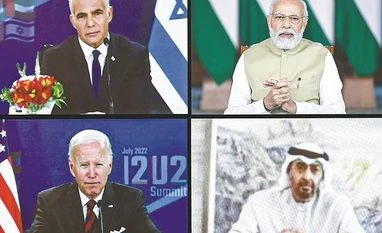Prime Minister Narendra Modi on July 14 joined US President Joe Biden, Israeli PM Yair Lapid and UAE President Mohammed bin Zayed Al Nahyan in the first ever meeting of I2U2. The leaders identified and agreed to work towards common areas of mutual interest.
The acronym 'I2' stands for India and Israel and 'U2' stands for US and UAE. I2U2 was first conceptualized during a meeting of the foreign ministers of the four countries in October last year. Not only the government synergies, the group will also aim to leverage private sector capital and expertise for many areas of economic cooperation. Each country will also have Sherpa-level interactions regularly.
The I2U2 bloc will focus on joint investments in six mutually identified areas such as water, energy, transportation, space, health, and food security.
While some alliances are crucial for enhanced co-operation on pressing issues plaguing the world, some of them became redundant over the years as they either failed or fell short in achieving the ambitious goals they had set out.
So, is there a need for one more such bloc and what are its geopolitical implications? As each of the four countries emerge as technological hubs, Washington could use the alliance to further expand its partnerships and reframe relationships in the Middle East that have suffered under the Donald Trump regime.
Geopolitical implications of I2U2
1) I2U2 could help US reframe ties with the Middle East
2) Indo-US partnership could be expanded beyond Asian interests.
3) I2U2 also offers an opportunity to deepen ties with the Middle East.
Meanwhile, I2U2 could not only help India deepen its ties with the Middle East, but also present an opportunity to expand ties with the US beyond Asia.
The inaugural I2U2 leaders meeting focused on the food security crisis and clean energy. Under the framework, the UAE has agreed to invest $2 billion to develop a series of integrated food parks across India that will incorporate state-of-the-art climate-smart technologies. The US and Israeli private sectors will lend their expertise to the project.
On the clean energy front, the US will set up a 300 megawatts (MW) hybrid renewable energy project in Gujarat's Dwarka, with an investment of $330 million. The project will be complemented by a battery energy storage system.
)